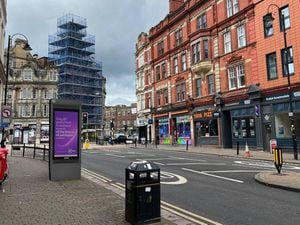New BT street hubs to replace phone kiosks in Wolverhampton city centre streets
Telephone kiosks in Wolverhampton city centre are to be replaced by free to use digital ‘street hubs’ – providing ultra-fast public and encrypted Wi-Fi, access to public services and a range of local information.

In line with the city’s ongoing conversion to the provision of full 5G internet, phone booths in Lichfield Street, Dudley Street and outside the Wulfrun Centre are amongst the first to be replaced by the new BT infrastructure, which will all have 75″ touch-use screens, better Wi-Fi range, environmental monitoring and expanded mobile network.
The new hubs that are being rolled out are designed to provide the community with a range of easy-to-use services including ultra-fast public and encrypted Wi-Fi, secure power-only USB ports for rapid device charging, free phone calls, a direct 999 call button, awareness messaging and environmental sensors to measure air quality, noise and traffic.
A BT report to city council planners, who gave the go-ahead for the new hubs this week, said: “BT is moving public connectivity forward. We’re evolving the payphone estate further with a move from InLink to Street Hubs – a sleek modern answer to the demands of a digitally connected, converged-media society.
“Street Hubs are smaller than comparable street furniture, and they give 876 hours of free council advertising per unit per year, direct access to charities through the use of the dedicated charity icon on the fully accessible interactive tablet, a community noticeboard with over 1,000 hours of content per year, and the street hub team can work with local groups to promote events and activities.
“Our approach to planning is to be collaborative with councils wherever possible, working closely with relevant stakeholders to identify suitable sites for street hubs and to select which payphones are to be removed."
It added: “Street Hubs are free-standing structures featuring a fully accessible tablet interface and digital HD display screens on two sides. The screens display content at 10-second intervals, both the commercial content that funds the service as well as a wide range of local community and council content.
“The screens automatically dim at night following daylight hours. There is a video camera above each screen, as well as built into the tablet. Every hub also provides access to maps giving directions to nearby landmarks and services – a valuable resource for visitors or those without access to a smartphone. They also act as wayfinding boards, giving walkers and cyclists clear directions.”





